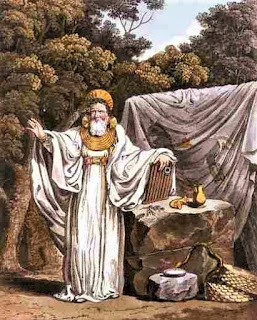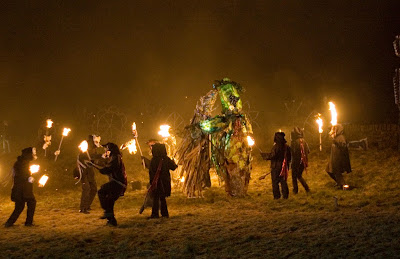HIST & MYTH: The Dagda - Father God Figure
Written by Ben Kesp.
Of all the Irish deities making up the pantheon of gods, the Dagda is seen as the most powerful and omnicompetent, unlike his counterparts who are often limited in their abilities.
What I found interesting on my research of the Dagda is his role when it came to the introduction of Christianity. Ireland’s culture and belief systems have been very insular due to its isolation from mainland Europe and its strong ties with its former pagan culture. The development of the Irish church intertwined and fused the old pagan beliefs into the new religion with many crossovers with the gods of old. It appears to have been easier to Christianise and bestow saint hood on former gods than to have them removed altogether. All of the old pagan customs and rituals were based on earth’s seasonal cycles of the year and each is attributed to a related god, so as the seasons impacted the people, so did the god.
The pagan Irish gods of old came from the “Otherworld” however with the onset of Christianity this would have become better known as “Tír na nÓg” meaning the “land of the forever young”. This place of existence has become associated with the hills and forts of Ireland or fairy forts. With the arrival of the mythical Milesians to Ireland at around the same recorded time period, for the arrival of the Celtic settlers and influence, the gods of old were not defeated but retreated under the mounds of Ireland and have since remained allowing the new religion and culture to take root. However, it appears all the gods and goddesses except for the Dagda fled to the underground palaces. So what happened to the Father God or Earth God?
It is possible and of course, there are many theories, that the Dagda, served as the father of the god for the new Christian religion intertwining the old with the new. The Irish Celtic Church was not Roman in influence but more Celtic in nature and the transition to the new religion probably would have had an easier cross over if it incorporated what people already believed in. The Goddess Brigit also survived this transition.
The Dagda is seen as the father of the Irish Gods, but not an origin god as many versions of myths depict him as the son of Goddess Danu making her the mother Goddess. The Dagda was the father to Brigit, Aine, Midir, Cermait, Bodh Dhearg and to Aengus, God of Love through an affair he had with the Goddess Boann of the River Boyne. In order to hide this infidelity, the Dagda had the sun stand still for nine months so Aengus was born in one day. Aengus later tricked his father into giving him his home at Brú na Boinne, which means palace, referring to the location of the world’s most important prehistoric Neolithic landscapes containing the Newgrange and Knowth monuments.
It is possible and probably a fact, that the Dagda’s role continued well into the Christian period transitioning into the father god for the Christian followers. To banish a belief system and to replace with another would be a difficult task so allowing the Dagda who represented the old beliefs and traditions of the seasonal cycles to continue, allowed people still to believe in him. Even though the Dagda was never bestowed with sainthood and his places of worship replaced with Christian shrines, his name lived on within the minds of the people allowing him not to disappear like the other gods of old.
The Dagda is depicted as an immense figure carrying a club capable of killing nine men with one blow and with a touch from its handle it gives life to the dead; he possessed a cauldron which never emptied ensuring abundance for everyone; a harp which ensured the seasons of the year followed one another in the correct order. This latter is amusing, considering that today Ireland lacks a divide in its seasons resulting in a jumbled mix of weather patterns rolling throughout the year. So I wonder should that harp be still playing!
The Dagda is certainly an interesting and complex figure in Irish myth and in the old belief systems. If his role was to serve as a cross over to the Christian religion, he has long since faded over the centuries that followed, however the Dagda will never truly be forgotten, having his name securely rooted as the Father God in Irish mythology.
Images: Celtic Mysteries & Pinterest




Comments
Post a Comment